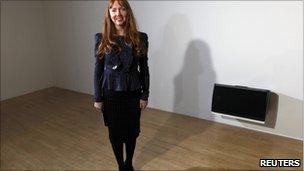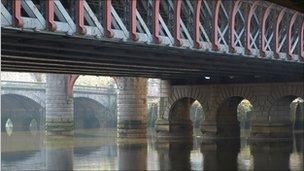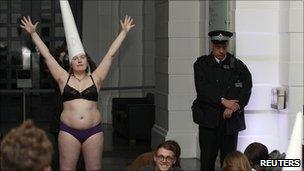Turner Prize: Susan Philipsz wins with Lowlands Away
- Published

Philipsz's work has been playing for the past two months in an empty room at Tate Britain
Susan Philipsz has won this year's Turner Prize for a sound installation that features her singing three versions of a Scottish lament.
The Glasgow-born artist, 45, was presented with the £25,000 prize at a ceremony at Tate Britain.
Philipsz beat Dexter Dalwood, Angela de la Cruz and The Otolith Group to take the prestigious award.
It was the first time a sound installation had been nominated for the modern art prize.
The artist, who is the fourth woman to win the award, said she was "very honoured" as she collected her prize from fashion designer Miuccia Prada.
Philipsz's work centres around recordings of her voice singing folk songs over public address systems.
'Quite exceptional'
She recorded three versions of Lowlands Away - a song about of a man drowned at sea who returns to tell his lover of his death - for her installation.
It was first performed beneath three bridges over the River Clyde in her native Glasgow, but for the past two months has been playing in an empty room at Tate Britain.

Lowlands was first performed beneath three bridges over the Ricer Clyde in Glasgow
The chairman of the judges, Penelope Curtis, praised Philipsz's work, saying: "Susan's presentation, both in Glasgow and in the way it transferred to the Tate, was quite extraordinary.
"The way she's managed to make you look at things differently by hearing things differently is really quite exceptional."
Philpsz, who now lives and works in Berlin, told the BBC winning the award had "not really sunk in yet".
"It's fantastic - I'm extremely happy to have won it, but it's been a wonderful experience to be nominated and these past few months have been great," she said.
"It's given me a lot of exposure here and I've not shown much in the UK."
Student sit-in
However critics of the prize have said the winning entry is music, not art.
The Stuckists, an art group opposed to the style of modern, conceptual art often recognised by the award, said the award should not go to a "singer".

About 100 students staged a sit-in at the gallery over university fees
"It's just someone singing in an empty room. It's not art. It's music," they wrote in advance of the announcement.
Reaction to the announcement has been mixed in the newspapers too.
The Independent said, external Philipsz's voice on the artwork sounded "drearily poker-faced, as if she is trying to haunt us with her voice. She does not succeed".
The paper went on to say that Philipsz winning the prize was a "dismal decision".
The Guardian's Adrian Searle said, external he felt the "right result" had been achieved.
"Her art makes you think of your place in the world, and opens you up to your feelings," he said.
Channel 4 News Culture Editor Matthew Cain said, external the win was a "shot in the arm for sound art".
He added: "The high-profile win for Susan Philipsz might just build this up to the tipping point needed for sound art to really take off."
Meanwhile, about 100 students staged a sit-in at the gallery protesting against education cuts and university fees.
Supporters of the protest also handed out leaflets outside the building warning that higher fees could lead to empty art schools.
Police were present inside the building, but no attempt was made to remove the students, who could be heard protesting during Philipsz's acceptance speech.
The artist acknowledged the students saying: "I support the arts against the cuts."
All the shortlisted artists received £5,000 prize money.
Dalwood's works featured paintings that tackle well-known moments from recent history, among them the death of Iraq weapons expert Dr David Kelly.
Video artists The Otolith Group - Anjalika Sagar and Kodwo Eshun - revived forgotten works of the past using archive material.
While de la Cruz ripped and folded her paintings in on themselves before displaying them in doorways, corners or on gallery floors.
Painter Richard Wright won last year's prize for his large-scale gold leaf frescos.
- Published7 December 2010
- Published5 October 2010
- Published4 May 2010